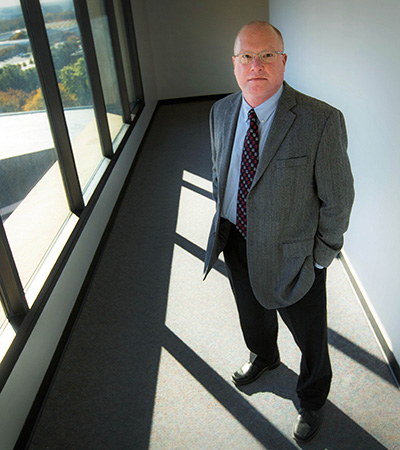A career path focused on reducing alcohol- and drug-related harms
By Sally Crocker
The year was 1986 when the country was stunned by the news that first-team All-American college basketball player Len Bias had died of a cocaine/alcohol overdose on the University of Maryland campus.
The young athlete – described by some sportswriters as one of the greatest college players ever – had just been drafted by the Boston Celtics two days before.
Ten days later, another prominent athlete, 23-year-old Don Rogers of the NFL’s Cleveland Browns, died from cocaine-induced cardiac arrest on the night before his wedding. Rogers had been named the NFL’s 1984 AFC defensive rookie of the year.
For doctoral student Dennis Thombs, the Bias death hit close to home and helped focus his academic work. As a Residence Life official at Maryland, he oversaw the cluster of residence halls where Bias had overdosed. Impact on the school was devastating, and Thombs remembers the era as a significant turning in American attitudes about drugs.
“Our culture was in a very different place in the ’80s,” said Dr. Thombs, now interim Dean of UNTHSC’s School of Public Health. “College-age drinking was widespread, and the country was at the height of recreational drug use. This is when we began hearing about Quaaludes, heroin, cocaine, PCP. We saw the introduction of First Lady Nancy Reagan’s ‘Just Say No’ campaign, and American opinion polls ranked the crack-cocaine epidemic as one of the nation’s biggest concerns.”
With degrees in sociology and mental-health counseling and a keen awareness of college challenges gained through his work at other universities, Thombs found his doctoral interests leading him more and more toward to an advanced study in substance abuse and addictive behaviors.
“Public health is a field of discovery,” he said. “Many of us find our way into public health, rather than specifically choosing the profession. It’s different from deciding to be a physician or a fireman or lawyer at a young age. There’s often a critical turning point we take to address a problem we want to help solve.”
Today, Thombs continues to work on research and solutions. He is recognized for his widely adopted textbook on addictive behavior, now in its 4th edition. In recent years, he received international acclaim for his studies on the effects of alcohol mixed with energy drinks. He also has led research teams in extensive studies of the risks associated with late-night drinking in bars and nightclubs catering to young adults. In the last 15 years, his research teams have conducted more than 25,000 face-to-face interviews with intoxicated bar and nightclub patrons late at night.
“Approximately 50 percent of American families are impacted by drug or alcohol addiction, through a first- or second-degree relative,” he said. “Not all individuals receive care or even recognize they need treatment. We see the results of addiction in the criminal justice system, the health care system and the toll on so many lives. Fortunately, many organizations both locally and nationally continue working to address these problems.”



![Uyen Sa Nguyen Scaled[58]](https://www.unthsc.edu/newsroom/wp-content/uploads/sites/16/Uyen-Sa-Nguyen-scaled58-145x175.jpg)


Social media